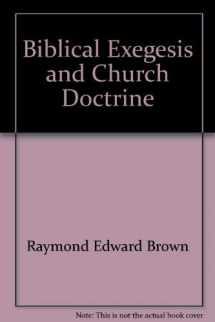
Biblical exegesis and church doctrine
Book details
Summary
Description
In Roman Catholic circles the novelty of contemporary scripture interpretation has been grasped on a surface level. Clearly, to most scholars, the gospels were not written by eyewitnesses and are not necessarily literal accounts of Jesus' words. Scholars assert that the Bible is a diversified library and not necessarily all history, and that many of the dogmas of the church go beyond what the original biblical authors and audience would have thought. To some liberally minded Catholics these assertions lessen the authority of doctrine and free them to search out totally new positions while ignoring what has been traditionally taught. To some more conservatively minded Catholics, horrified by the possibility of doctrinal breakdown, the only answer is to reject contemporary biblical exegesis with its historical and critical components and to hold on stubbornly to past attitudes toward scripture as if such attitudes were themselves doctrine. This book argues that neither reaction has grasped the novelty of scripture interpretation at a depth level. Centrist Catholic New Testament interpretation, while firm in its historical approach to the scriptures, often detects lines of development that form an intelligible connective between the biblical period and the doctrines of the later church. Indeed the implications of such a centrist exegesis place the authority for doctrine where it has always been in genuine Catholic thought (as opposed to biblical fundamentalism): not in the book but in the church interpreting the book. As it faces new situations, the church under the guidance of the Spirit gains new insights into the revelation to which the Bible bears witness.


We would LOVE it if you could help us and other readers by reviewing the book
Book review



